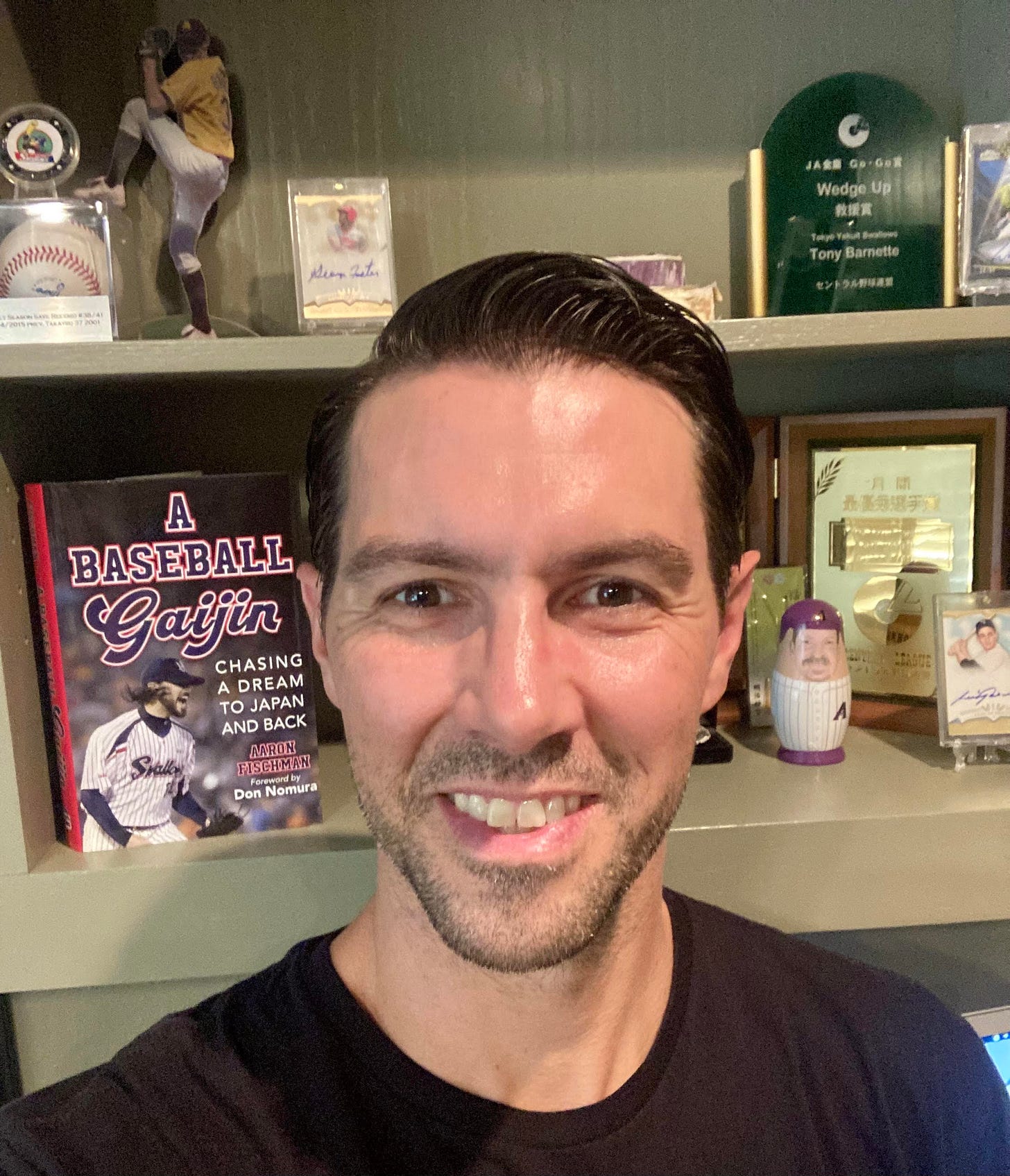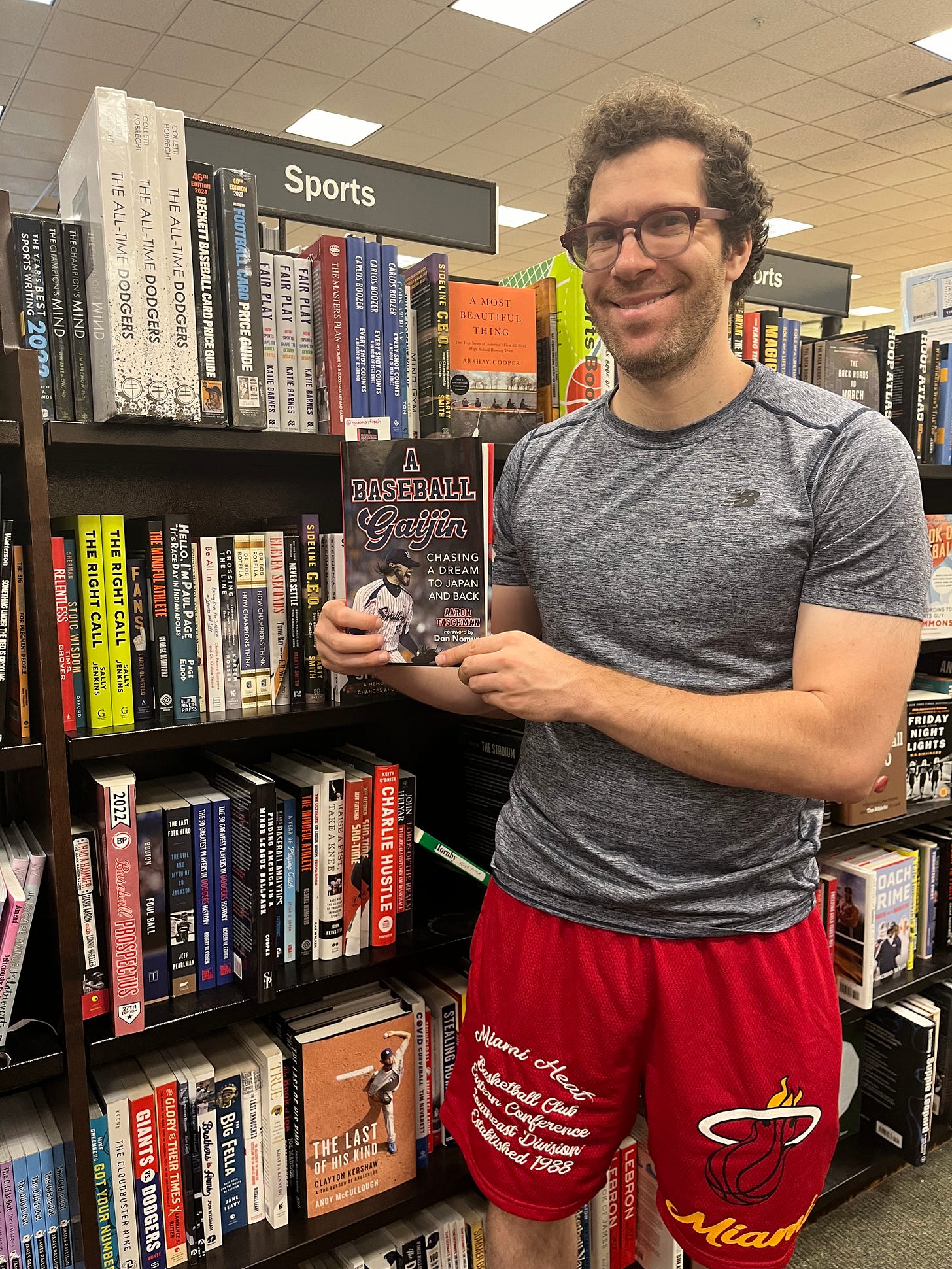Toreba no Toraba: Barnette's Dream = Fischman's Chance!
from Daily Sports Online, November 2024
Here we go again: another offseason filled with the names of Japanese superstars taking their talents to Major League Baseball: Roki Sasaki, Tomoyuki Sugano, Shinnosuke Ogasawara, and even our own Koyo Aoyagi, are hoping to don new uniforms while raking in dollars and cents instead of the ever-weakening Japanese yen.
In recent years, Japanese baseball stock has risen sharply, as the talent that has gone stateside has translated reasonably well. Shohei Ohtani, Yoshinobu Yamamoto, Shota Imanaga are just a few names that have made a splash from the mound, undoubtedly turning a lot of eyes and causing international scouting teams to redouble their efforts to find the next great Japanese arm.
In doing so, those scouts have uncovered “other” talent that, while not native to Japan, discovered the secret to pitching success while part of an NPB team. So much so, that these guys not only starred for their Japanese teams, but got an invitation to sign with a North American club, prolonging their careers and achieving what was perhaps their initial dream. The list includes “imports” like Ryan Vogelsong, Rafael Dolis, Miles Mikolas, Nick Martinez, Robert Suarez, and Tony Barnette.
Surely, each of these guys has a unique story to tell about coming halfway around the world only to be discovered by an MLB club. It sure would be nice to know these stories in some detail, wouldn’t it? Well, you’re in luck. For one of them, anyways. Earlier this year, Aaron Fischman, a longtime journalist, released a thick volume detailing Tony Barnette’s life arc to this point. A Baseball Gaijin: Chasing a Dream to Japan and Back includes a childhood dream left unfulfilled, a difficult decision to abandon that dream to try baseball in Japan, adjusting to a new life in NPB, moving to the bullpen, starting over again from square one, succeeding, being scouted by MLB teams, winning a championship in Japan, and then moving back to the States to realize the original dream.
It truly is a fascinating story, but let’s face it - the man only played parts of four seasons in MLB, coming out of the bullpen (to much less fanfare than an ace starter or a closer), so what would compel anyone to want to write Barnette’s story, let alone follow it in the first place? Turns out, this is where things get interesting. As an undergrad at University of California Davis, Fischman reached out to a bunch of Double-A pitchers with the hopes of interviewing and collaborating with them. The only pitcher to reply to the cold call? You guessed it - Tony. After a few podcasts and blog entries, their relationship had become solidified, and they stayed in touch even while Tony was in Tokyo trying to establish himself in the Yakult Swallows organization.
For one of his final projects in grad school, Fischman started drafting Tony’s story. However, at that point it was still not anything that could be turned into book format, at least not for an American audience that still did not know who Tony Barnette was. It was only when Barnette signed with the Texas Rangers after the Swallows’ 2015 CL pennant season that Fischman approached him about fleshing the whole thing out into a lengthy biography.
Tony’s reaction? “At first, I thought it was weird. Would anyone want to read my biography? But as I thought about it more, I realized that it might be a worthwhile read because people could see that I persevered through a lot.”
His willingness to cooperate with the project also gave Fischman access to the Rangers’ clubhouse, where talking to MLB stars was “a bit intimidating,” he admits, but also a cool perk of writing this story. While Fischman focused the narrative on Barnette’s life, he was not afraid to take the scenic route at times, delving into the stories of Barnette’s teammates (like Aaron Guiel), his interpreter (Go Fujisawa), an English blogger (David Watkins of TokyoSwallows.com) and others. It is not a linear story, as various characters intersect and get time in the spotlight as well. In doing so, the audience finds various ways to relate to what is unfolding in Tony’s life. “A player’s success on the field is never as easy as it looks,” Barnette explains. “There are ups and downs. Players put in a lot of time and effort, both mental and physical, and they sacrifice a lot of family and personal moments that many (non-baseball) people take for granted. I missed a lot of friends’ weddings and funerals of loved ones. There’s more to [a player’s life] than just the game. And their families also sacrifice for the player.”
Barnette definitely took his lumps while here in Japan. The fact that he lasted six seasons (2010-15) was a miracle in and of itself. He had such a rough 2010 that the team did not sign him back. “I was calling around to minor league clubs [in the USA], thinking that my life in baseball was done. But my agent called me around Christmas and said that the Swallows were considering bringing me back as a reliever. I thought, ‘I’m in. Heck, if they tell me to stand on my head and pitch that way, I’ll do it. I was at their mercy.’ And I accepted everything, started from scratch, and never gave up.” The 2011 season was a great one for Barnette, who sawed his ERA in half from what it had been the previous year. However, on a personal note, he suddenly lost his older brother. While his baseball numbers got even better in 2012, the team started to slide in the standings. Two rough years later (individually and as a team), Barnette and the Birds put it all together in 2015, when they won their first pennant in 14 years.
“Beating the Giants in the Climax Series and ending it by striking out [Yoshinobu] Takahashi was definitely the highlight of my career.” And yet it was the beginning of the end of his playing days in Japan. “Around three-quarters of the way through the year, the scouts started talking to my agent and even to my wife in the stands.” His MLB dreams were about to come true.
And this is where Fischman saw an opportunity to share Barnette’s journey with baseball fans in America as well. “I wanted baseball fans here to enjoy it, but a lot of the themes can strike chords with anyone - achieving your lifelong dream, feeling like a foreigner…” And as a side benefit, Barnette sees this book serving one more important function in his own life: “It is like a love letter to my kids. They were too young to remember our time in Japan, but when they read this they will see how they got to where they are. They will see how good baseball was to our family.”
Baseball continues to be good to the Barnette family, as Tony is currently employed as an area scout for the Tokyo Yakult Swallows. “It’s great. I get to watch baseball all day. When I go to games, I meet old friends, other scouts, and we talk baseball. Who could ask for a better job?” As for Fischman, he has had his first full-length book named as a finalist for the Casey Award, given to the outstanding baseball book of the year. “I'm honored to be listed alongside some talented authors who have written about renowned figures like the late Pete Rose and Clayton Kershaw,” says Fischman.
Up next? Both Fischman and Barnette are hoping to see the book translated into Japanese so another nation of baseball (and Barnette) fans can enjoy the literary work. Indeed, Tony Barnette’s name most certainly carries greater fame on this side of the Pacific, and surely, thousands would gobble the book up if it were written in their language.
As for me? Well, this book (and the interviews I conducted for this article) have drummed up yet another project idea for me. Why not compile a tome that looks something like Fischman’s, but also a bit like those of past writers (the late Marty Kuehnert, Keio professor Masaru Ikei, among others) who pay tribute to the great foreigners who have poured their lives into this beautiful game? Mine would obviously center around Hanshin Tigers fan favorites (and forgottens). What say you, Hanshin Tigers fans? Should I do it? Whom shall I feature?
Glossary
here we go again - また始まった: 過去に経験したことが繰り返されることを指す表現。
don - 着用する: 服や装備を身につけること。
rake in - 荒稼ぎする: 大量の利益や報酬を得ること。
ever-weakening - 弱体化し続ける: 徐々に力や影響を失うこと。
translate well - よく適応する: ある状況や文化にうまく適応すること。
make a splash - 大きな注目を浴びる: 目立った行動や成果を見せること。
redouble one's efforts - 努力を倍増する: より一層の努力をすること。
you're in luck - 運が良いね: 幸運にも良い状況に恵まれていること。
unfulfilled - 未達成の: 目標や期待が実現していないこと。
square one - 振り出し: 最初の状態に戻ること。
let's face it - 現実を直視しよう: 回避できない事実を受け入れるべきだという意味。
__ let alone __ - ~はおろか: ~どころか、さらに…という強調表現。
turns out ___ - 結局~ということがわかる: 予想外の結果や事実が明らかになることを表す。
undergrad - 学部生: 大学の学士課程に在籍する学生。
cold call - 飛び込み営業: 事前の連絡なしに電話や訪問をすること。
draft - 下書きをする: 初めての案や文章を作成すること。
flesh the whole thing out - 全体像を具体化する: 考えや計画に詳細を加えること。
delve into - 深く掘り下げる: 詳細に調査すること。
took his lumps - 痛い目を見た: 失敗や困難に直面したこと。
at __'s mercy - ~の支配下にある: 他者や状況に完全に左右されること。
start from scratch - ゼロから始める: 完全に新たな状態から取り組むこと。
saw - (比喩的に)切り分ける: 実際の鋸を使うわけではないが、何かを分割したり二つに分けたりするイメージで使われる表現。
strike a chord - 心に響く: 強い共感や感情を引き起こすこと。
Who could ask for __? - ~を望む人なんている?: 満足や皮肉を込めた表現。
renowned - 著名な: よく知られた、評判の良い。
gobble up - 貪るように食べる: 急いで大量に吸収すること。
drum up - 呼び込む: 支援や関心を引きつけること。
pay tribute to - 敬意を表する: 人や事物に感謝や尊敬を示すこと。
往年のヤクルト最強助っ人守護神「僕の伝記なんて誰か読みたいの?」 MLB逆輸入の物語が米国で書籍化されて話題
再びストーブリーグがやってきました。日本のスーパースターたちが次々とメジャーリーグに挑戦するオフシーズン。今年は佐々木朗希、菅野智之、小笠原慎之介、そして我らが青柳晃洋までも…。大谷翔平、山本由伸、今永昇太らの活躍がMLBの太平洋地区スカウトの目を日本に向けさせ、その過程で意外な才能も発掘されました。それはNPBで成功のコツを掴んだ助っ人たち。ドリス(阪神→ブルージェイズ)、マイコラス(巨人→カージナルス)、スアレス(阪神→パドレス)、バーネット(ヤクルト→レンジャース)などなど。彼らはNPBで開花し、MLBでキャリアを延ばして夢を叶えました。このコラムでは、その中でもトニー・バーネットの物語にスポットライトを当てます。
今年、アメリカのジャーナリストであるアーロン・フィッシュマンさんがバーネット氏の人生を描いた分厚い本を出版しました。題名は「A Baseball Gaijin: Chasing a Dream to Japan and Back」。子どもの頃から抱いていた「MLB選手になる」という夢を諦め、日本で再出発→リリーフ投手転向で成功を掴み、やがてMLBのスカウトに注目される。そんな波乱万丈のストーリーが詰まっています。
とはいえ彼はMLBで4年間のみプレーしたリリーフ投手であり、一般的には書籍化されるほどではないかもしれません。バーネット氏自身も当初は「僕の伝記なんて誰か読みたいの?と思いました」と戸惑ったそうです。実は、ここが面白いところ。フィッシュマンさんが大学時代、多くの3Aの投手たちに取材を申し込んだ時期に唯一返事をくれたのがバーネット氏。それから2人の関係は続き、バーネット氏のヤクルト時代も連絡を取り合っていました。
本格的に執筆を始めたのは、バーネット氏がヤクルトで優勝した2015年シーズン後にテキサス・レンジャーズと契約した頃。MLBでの契約を機に彼の物語を長編にするチャンスが訪れたのです。書籍化に戸惑っていたバーネット氏自身も「いろいろ考えてみると、自分の人生が多くの困難を乗り越えてきたことを知ってもらえるのは、意味があることだと思ったんです」と心境に変化が生まれたといいます。
本人の全面協力で、著者はレンジャーズのクラブハウスにも取材が可能に。ストーリーの中心人物はバーネット氏ですが、ヤクルト時代のチームメイトや通訳、さらには英語ブログの運営者など、さまざまな人物のエピソードを織り交ぜ、第三者がバーネット氏をどう見てたかを深く理解することによって、読者がその人生に共感できるように描かれています。
彼のヤクルトでのキャリアは、決して平坦な道ではありませんでした。2010年シーズンの不振で一度契約を切られ、年末に「リリーフとして再契約の可能性がある」と代理人からの連絡が。彼は迷わず飛びつき「言われた通りにやります」と初心に帰って努力を重ねました。その判断が日本での成功、そして2015年の優勝につながったのです。
現在、彼はヤクルトの駐米スカウトとして活動しており「毎日野球を見るなんて最高の仕事」と満足げ。本はアメリカで注目を集め、野球書籍の賞にもノミネートされました。次はこの本が日本語に翻訳され、さらに多くのファンに届けられることを2人とも願っています。
刺激を受けた筆者にも新しいアイデアが湧いてきました。フィッシュマンさんのように、阪神タイガースで活躍した外国人選手の物語を書いてみたい!ファンの皆さん、どう思います?誰を特集すべきですか?






